- Home
- William Kennedy
Legs Page 5
Legs Read online
Page 5
Fogarty leaned over the seat to tell Jack, "'We didn't know she was listening or we . . ."
"Shut your fucking mouth."
We drove a few miles in silence, and then Jack said in as tone that eliminated the canary episode from history, "I'm going to Europe. Ever been to Europe?"
"I was there with the AEF," I said. "But it was a Cook's Tour. I was in a headquarters company in Paris. Army law clerk."
"I was in Paris. I went AWOL to see it."
"Smart move."
"When they caught up with me, they sent me back to the States. But that was a long time ago. I mean lately. You been to Europe lately?"
"No, that was the one and only."
"Fantastic place, Europe. Fantastic. I'd go all the time if I could. I like Heidelberg. If you go to Heidelberg, you got to eat at the castle. I like London, too. A polite town. Got class. You want to go to Europe with me, Marcus?"
"Me go to Europe? When? For how long?"
"What the hell's the difference? Those are old lady questions. We go and we come back when we feel like it. I do a little business and we have ourselves some fun. Paris is big fun, I mean big fun."
"What about your business here? All those hotels. All those speakeasies."
"Yeah, well, somebody'll look after it. And it won't be all that long of a trip. Goddamn it, a man needs change. We get old fast. I'm an old son of a bitch, I feel old, I could die any time. I almost died twice already, really close. So goddamn stupid to die when there's so many other things to do. Jesus, I learned that a long time ago; I learned it in Paris from an old crone—old Algerian chambermaid with her fingers all turned into claws and her back crooked and every goddamn step she took full of needles. Pain. Pain she wanted to scream about but didn't. Tough old baby. I think she was a whore when she was young, and me and Buster Deegan from Cleveland, we went AWOL together to see Paris before they shot us in some muddy fucking trench, and we wind up talking every morning to this old dame who spoke a little English. She wore a terrycloth robe—maybe she didn't even own a dress—and a rag on her head and house slippers because her feet couldn't stand shoes. We double-tipped her every day and she smiled at us, and one day she says to me, 'M'sieur, do you have fun in Paris?' I said I was having a pretty good time. 'You must, M'sieur,' she said to me. 'It is necessary.' Then she give me a very serious look, like a teacher giving you the word, and she smiled. And I knew she was saying to me, yeah, man, I got pain now, but I had my day long, long ago, and I still remember that, I remember it all the time."
I'd been watching Jack have fun all day, first with his machine gun and then his champagne and his Rabelais and his dream of a purple mansion; but his fun was nervous, a frenetic motion game that seemed less like fun than like a release of energy that would explode his inner organs if he held it in.
We were climbing a mountain by this time, along a two-lane road that wound upward and seemed really about as wide as a footpath when it snaked along the edges of some very deep and sudden drops. I saw a creek at one point, visible at the bottom of a gorge. When you looked up. you saw mountains to the left, and you climbed and climbed and climbed and then made a hairpin turn and saw a waterfall cascading down the side of a great cliff.
"Get a look at that," Jack said, pointing. "Is that some sight?"
And at another sharp turn he told Fogarty to stop, and we both got out and looked back down the mountain to see how far and how, steeply we had climbed; and then he pointed upward where you could see more mountains beyond mountains. The stop was clearly a ritual for Jack, as was pointing out the waterfall. It was his mountain range somehow, and he had a proprietor's interest in it. We made a cigarette stop as we entered Haines Falls, a store where Jack knew they carried Rameses, his exotic, Pharaonic brand, and he dragged me to the souvenir counter and urged me to buy something.
"Buy your wife a balsam pillow or an Indian head scarf."
"My wife and I split up two years ago."
"Then you got no reason not to go to Europe. How about a cigarette box for yourself or a pinetree ashtray?"
I thought he was kidding, but he was insisting; a souvenir to seal our bargain, a trinket to affirm the working relationship. He fingered the dishes and glassware with their gaudy Catskill vistas, the thermometers framed in pine, toothbrush holders, inkstands, lampstands, photo albums, all with souvenir inscriptions burned into them, commemorating vacation time spent in this never—never land in the clouds. I finally agreed on a glass paperweight with an Indian chief in full war bonnet inside it, and Jack bought it. Forty-nine cents. The action was outrageously sentimental, the equivalent of his attitude toward that Algerian crone or the deceased brother, from whom, I would later come to know, Jack felt all his good luck had come. "All my troubles happened after Eddie died," Jack told me in the final summer of his life when he was learning how to die. Thus his replacement of the brother with Fogarty had a talismanic element to it. Talismanic paperweight, talismanic brother-substitute, talismanic memory of the Arthritic Witch of Fun. And here we were in old talismanic Haines Falls, the highest town in the Catskills, Jack said, and of course, of course, the proper place for him to stash the queenly consort of his fantasy life, the most beautiful girl I've ever known.
* * *
Jack said he once saw Charlie Northrup belly-bump a man with such force that the man did a back-flip over a table. Charlie was physical power, about six four and two forty. He had a wide, teeth-ridden smile and blond hair the color and straightness of straw, combed sideways like a well-groomed hick in a tintype. He was the first thing we saw when we entered Mike Brady's Top o' the Mountain House at Haines Falls. He was at the middle of the bar, standing in brogans with his ankles crossed, his sportshirt stained with sweat from armpit to armpit, drinking beer, talking with the bartender, and smiling. Charlie's smile went away when he met Jack eyeball to eyeball.
"Missed you the other night, Charlie," Jack said.
"Yeah. I think you're gonna keep missing me, Jack."
"That's a wrong attitude. "
"May be. But I'm stuck with it."
"Don't be stupid, Charlie. You're not stupid."
"That's right, Jack. I'm not stupid."
Jack's face had all the expression of an ice cube, Charlie's full of overheated juices. He was telling Jack now about something I had no clue to; but from their tone there were confidences between them. It turned out Charlie was responsible for Jack being in the Masons. They had been young thieves together on Manhattan's West Side in 1914, running with The Gophers, a gang Owney Madden led until he went to jail for murder. They both wound up in the Bronx about 1925, with Charlie gone semi-straight as a numbers writer and Jack a feared figure in the New York underworld because of his insane gang tactics and his association with the powerful Arnold Rothstein. Jack had also opened a place he called The Bronx Theatrical Club, whose main theatrical element was Jack's presence as a performing psychopath. I say performing because I don't think Jack was psychopathic in its extreme sense. He was aberrated, yes, eccentric, but his deeds were willful and logical, part of a career pattern, even those that seemed most spontaneous and most horrendous. He was rising in the world, a celebrated hijacker, and Charlie was a working stiff with money problems. Charlie married Jimmy Biondo's sister and they vacationed in the Catskills. When times got very rough in New York, Charlie and some two-bit Jersey thieves bought a defunct brewery in Kingston and went into shoestring bootlegging. In the years after, Charlie opened his roadhouse and also became the biggest beer distributor in Greene and Ulster counties. He was tough, with a reputation for muscle if you didn't pay promptly for your goods. But he was different from Jack. Just a bootlegger. Just a businessman.
"I'm having a little meeting tomorrow night," Jack told him, "for those who couldn't make it to the last one."
"I'm booked up."
"Unbook, Charlie. It's at the Aratoga. Eight o'clock. And I'm all business, Charlie. All business."
"I never knew you to be anything else, Jack."
/> "Charlie, old brother, don't have me send for you."
Jack left it there. turned his back on Charlie and walked down the bar and into the table area where only one table was occupied: by that beauty in a white linen suit and white pumps; and at the table with her a five-foot-five, one-eyed, waterheaded gnome. This was Murray (The Goose) Pucinski who'd worked for Jack for the past five years.
"Oh, God, Jack, oh, God where've you been?" was Kiki's greeting. She stood to hug him.
Jack squeezed her and gave her a quick kiss, then sat alongside her.
"She behaving herself, Goose?" Jack asked the waterhead.
Goose nodded.
"How could anybody misbehave up here?" Kiki said, looking me over. I was struck by the idea of misbehaving with her. That was the first logical thing to consider when you looked at Kiki. The second was the flawless quality of her face, even underneath all that professionally applied makeup; a dense rather than a delicate beauty, large, dark eyes, a mouth of soft, round promise, and an abundance of hair, not black as Alice had said, but auburn, a glorious Titian mop. Her expression, as we visually introduced ourselves, was one of anxious innocence. I use the phrase to describe a moral condition in fragments, anxious to be gone, but with a large segment still intact. The condition was visible in the eyes, which for all their sexual innuendo and expertise, for all their knowledge of how beauty rises in the world, were in awe, I suspect, of her rarefied situation: its prisonerlike quality, its dangers, its potential cruelties, and its exhilarating glimpses of evil. By eye contact alone, and this done in a few seconds, she conveyed to me precisely how uneasy she was with The Goose as her chaperon. A quick glance at him, then at me, then a lift of the eyebrows and twist of the pursed lips, was my clue that The Goose was a guardian of negative entertainment value.
"I wanna dance," she said to Jack. "Jackie, I'm dying to dance. Speed, play us something so we can dance."
"It's too early to dance," Jack said.
"No. it isn't"—and her entire body did a shimmy in anticipation. "Come on, Joey, come on, puh-leeeze."
"My fingers don't wake up till nine o'clock at night," Fogarty said. "Or after six beers."
"Aw, Joey."
Fogarty hadn't sat down yet. He looked at Jack who smiled and shrugged, and so Fogarty went to the piano on the elevated bandstand and, with what I'd call a semipro's know-how, snapped out a peppy version of "Twelfth Street Rag." Kiki was up with the first four bars, pulling Jack to his feet. Jack reluctantly took an armful of Kiki, then whisked her around in a very respectable foxtrot, dancing on the balls of his feet with sureness and lightness. Fogarty segued into the "Charleston" and then the "Black Bottom," and Kiki split from Jack and broke into bouncily professional arm maneuvers and kicks, showing a bit of garter.
Interested as I was in Kiki's star and garter performance, it was Jack who took my attention. Was Legs Diamond really about to perform in public? He stood still when Kiki broke away, watched her for a step or two, then assessed his audience, especially the bar where Charlie Northrup and the barkeep were giving Jack full eyeball.
"C'mon, Jackie," said Kiki, her breasts in fascinating upheaval. Jack looked at her and his feet began to move, left out. right kick, right back, left back, basic, guarded, small-dimensioned movements, and then "C'mon. dance," Kiki urged, and he gave up his consciousness of the crowd and then left out, right kick, right back, left back expanded, vitalized, and he was dancing, arms swinging, dancing, Jack Diamond, who seemed to do everything well, was dancing the Charleston and Black Bottom, dancing them perfectly, the way all America had always wanted to be able to dance them—energetically, controlled, as professionally graceful as his partner who had danced these dances for money in Broadway shows, who had danced them for Ziegfeld; and now she was dancing on the mountaintop with the king of the mountain, and they were king and queen of motion together, fluid with Fogarty's melody and beat.
And then above the music, above the pounding of Fogarty's foot, above the heavy breathing and shuffling of Jack and Kiki and above the concentration that we of the small audience were fixing on the performance, there came the laughter. You resisted acknowledging that it was laughter, for there was nothing funny going on in the room and so it must be something else, you said to yourself. But it grew in strength and strangeness, for once you did acknowledge that yes, that's laughter all right, and you said, somebody's laughing at them, and you remembered where you were and who you were with, you turned (and we all turned) and saw Charlie Northrup at the end of the Z bar. pounding the bar with the open palm of his right hand, laughing too hard. The bartender told him a joke, was my thought. but then Charlie lifted the palm and pointed to Jack and Kiki and spluttered to the barman and we all heard, because Fogarty had heard the laughing and stopped playing and so there was no music when Charlie said, "Dancin'. . . the big man's dancin' . . . dancin' the Charleston on Sunday afternoon . . . and then Jack stopped. And Kiki stopped six beats after the music had and said, "What happened?"
Jack led her to the table and said, "We're going to have a drink," and moved her arm and made sure she sat down before he walked to the bar and spoke to Charlie Northrup in such a low voice that we couldn't hear. Charlie had stopped laughing by then and had taken a mouthful of beer while he listened to whatever it was Jack said. Then he swallowed the beer, and with a mirthless smile he retorted to Jack. who did not wait for the retort but was already walking back toward us.
"I'm trembling, brother," Charlie called to him. "Trembling." He took another mouthful of beer, swished it around in his mouth, and spat it in a long arc after Jack. Not hitting him, or meaning to, but spitting as a child spits when he can think of no words as venomous as his saliva. Then he turned away from the direction of his spit, swallowed the last of his beer, and walked his great hulk out of the bar.
Holy Flying Christ, I said to myself when I understood Charlie's laughter and saw the arc of beer, for I understood much more than what we were all seeing. I was remembering what Jack's stylized terror could do to a man, remembering Joe Vignola, my client in the Hotsy Totsy case, a man visited not by Jack's vengeance but merely by the specter of it. I was remembering Joe on his cot in the Tombs, tracing with his eye a maze a prisoner before him had drawn on the wall, losing the way, tracing with his finger, but the finger too big, then finding a broom straw and tracing with that. And scratching his message above the maze with a spoon: Joe Vignola never hurt nobody, but they put him in jail anyway. Joe was dreaming of smuggling a gun in via his wife's brassiere, but he couldn't conceive of how to ask her to do such an embarrassing thing. And the district attorney was explaining almost daily to him, it's just routine, Joe, we hold 'em all the time in cases like this, an outrage, as you know, what happened, and we must have witnesses, must have them. Also a precautionary measure, as l'm sure you're aware, Joe, you're safer here. But I want to go home, Joe said, and the DA said, well, if you insist, but that's twenty thousand. Twenty thou? Twenty thou. I'm not guilty, you've got the wrong man. Oh no, said the DA, you're the right man. You're the one who saw Legs Diamond and his friends being naughty at the Hotsy Totsy. I'm not the only one, Joe said. Right, Joe, you are not the only one. We have other witnesses. We have the bartender. We have Billy Reagan, too, who is coming along nicely. An open-and-shut case, as they say.
* * *
Joe Vignola was in jail eight days when his wife got a phone call. Somebody, no name, told her: Look on such and such a page of the Daily News about what happened to Walter Rudolph. Walter Rudolph was the DA's corroborating witness, and two kids had found him lying off the Bordentown Turnpike near South Amboy, wearing his blue serge suit, his straw hat alongside him, eleven machine-gun slugs in him.
I was called into the case at this point. Vignola's lawyer was suddenly inaccessible to Vignola's wife, and an old show business friend of mine, Lew Miller, who produced Broadway shows and had patronized the Hotsy and gotten to know Joe Vignola well enough to go to bat for him, called me up and asked me to see what I could d
o for the poor bird.
Memory of my first interrogation of Joe: Why did you tell the cops what you saw? Why did you identify photos of Jack Diamond and Charlie Filetti for the grand jury?
Because I wanted people to know I had nothing to do with it. Because I didn't want them to put me in jail for withholding evidence. And a cop slapped me twice. But why, really, Joe? Did you want your name in the l papers, too?
No, because Billy Reagan had talked and would be the main witness and because the cops had at least twenty-five other witnesses who were in the club, and they told the same story I did, the DA said.
But, Joe, knowing what we know about Jack Diamond and people like him, how could you do it? Was it time to die?
Not at all. Basically, I don't approve of murder, or Jack Diamond or Charlie Filetti either. I was brought up a Catholic and I know the value of honesty. I know what a citizen has to do in cases like this. Don't I hear it in church and on the radio and in the papers about being a good citizen? We can't let these bums take over America. If I don't stand up and fight, how can I expect the next guy to stand up? How could I look myself in the mirror?
But why, Joe? Lay off the bullshit and tell me for chrissake, why?
Why? Because it takes big balls. Because Jack Diamond was always cracking wise about the guineas and nobody is going to say that Joe Vignola is a yellow-bellied guinea. Joe Vignola is an Italian-descent American with big balls.
Big balls, Joe? Was that really it'?
Right.
You dumb bastard.
* * *
I got in touch with the lawyer for Charlie Filetti, who they caught in Chicago and hit with murder one. They hadn't picked up Jack. I told the lawyer poor Joe was of no use to the prosecution because he would not be able to remember anything at the time, and that I wanted to be in touch with somebody in the Diamond gang who I could relay this message to at first hand so that Jack would also know what Joe was up to, which was not much. The lawyer put me on to Jimmy Biondo, who met me at the Silver Slipper on Forty-eighth Street one night. We talked briefly, as follows:

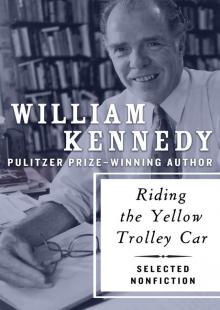 Riding the Yellow Trolley Car: Selected Nonfiction
Riding the Yellow Trolley Car: Selected Nonfiction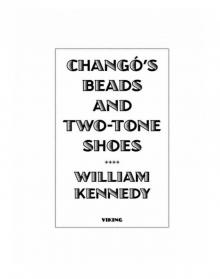 Changó's Beads and Two-Tone Shoes
Changó's Beads and Two-Tone Shoes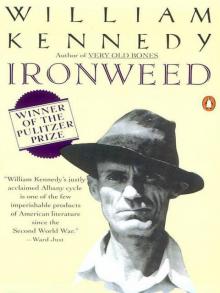 Ironweed
Ironweed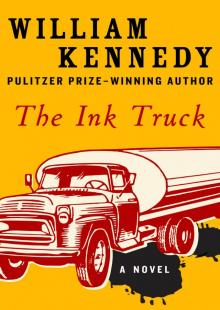 The Ink Truck
The Ink Truck Billy Phelan's Greatest Game
Billy Phelan's Greatest Game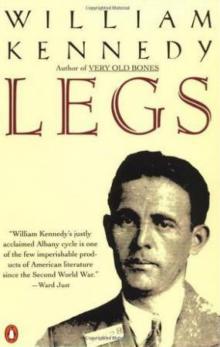 Legs
Legs Very Old Bones
Very Old Bones The Last Mission
The Last Mission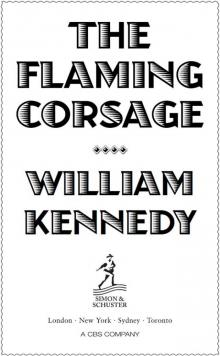 The Flaming Corsage
The Flaming Corsage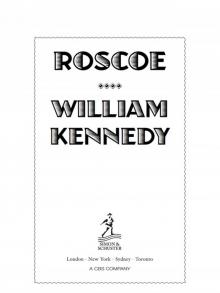 Roscoe
Roscoe Quinn's Book
Quinn's Book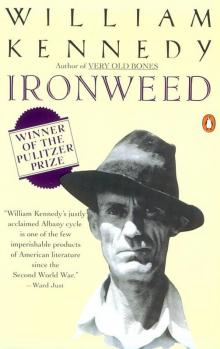 Ironweed (1984 Pulitzer Prize)
Ironweed (1984 Pulitzer Prize)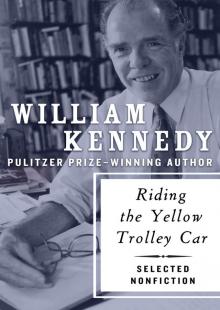 Riding the Yellow Trolley Car
Riding the Yellow Trolley Car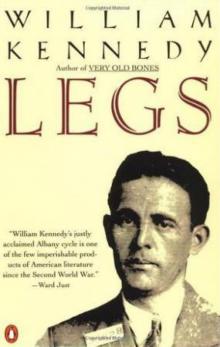 Legs - William Kennedy
Legs - William Kennedy